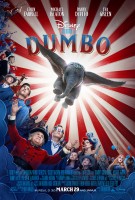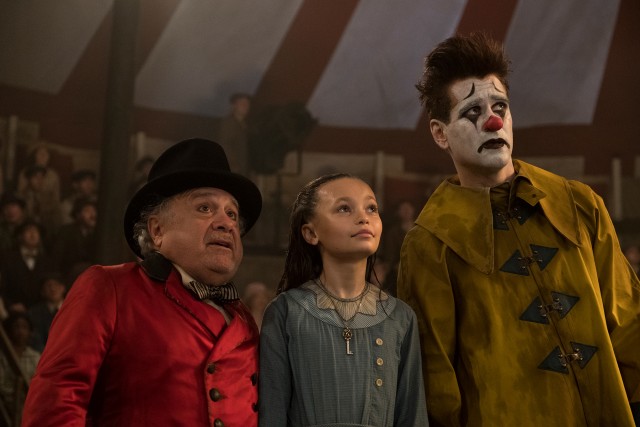Dumbo (2019) Movie Review
 |
Dumbo
Theatrical Release: March 29, 2019 / Running Time: 112 Minutes / Rating: PG Director: Tim Burton / Writers: Ehren Kruger (screenplay); Helen Aberson, Harold Pearl (book) Cast: Colin Farrell (Holt Farrier), Michael Keaton (V.A. Vandevere), Danny DeVito (Max Medici), Eva Green (Colette Marchant), Alan Arkin (J. Griffin Remington), Nico Parker (Milly Farrier), Finley Hobbins (Joe Farrier), Roshan Seth (Pramesh Singh), Lars Eidenger (Hans Brudelbecker), Deobia Oparei (Rongo), Joseph Gatt (Neils Skellig), Miguel Muñoz Segura (Ivan the Wonderful), Zenaida Alcalde Alcalde (Catherine the Greater), Douglas Reith (Sotheby), Phil Zimmerman (Rufus Sorghum), Sharon Rooney (Miss Atlantis), Frank Bourke (Puck the Organ Grinder), Ragevan Vasan (Pramesh's Nephew), Michael Buffer (Baritone Bates), Sandy Martin (Verna the Secretary) |
At the moment, Disney seems determined to remake all of their most popular animated films in a mix of live action and CGI. It's hard to object to the strategy from a purely business perspective. With a modest amount of creativity, the studio has managed to tighten its stranglehold on the box office, supplement the steady stream of blockbusters coming in from their titanic acquired brands, and renew interest in their catalog of past triumphs, Among the latest project to undergo this treatment is Dumbo. The fourth of Walt Disney's first five animated features all regarded as masterpieces by most film historians and critics, Dumbo (1941) also happens to be the studio's slightest and most dated of the so-called Golden Age efforts. Dumbo has also never been as beloved by the general public as the other four. It never sold well enough to make the studio's Platinum line of bestsellers, even when that line was expanded to include more than ten. Dumbo II was one of the rare direct-to-video sequels Disney announced and promoted that failed to materialize. And while everyone seems to know that Dumbo as a big-eared elephant who could fly, the average person and even casual Disney fan might struggle to tell you any more than that.
Bolstering the credibility of this Dumbo remake was its director's chair being occupied by Tim Burton, a reliable visionary whose body of work includes commercial performers and cult classics alike, plus the live-action remake Disney's present craze can be traced back to. This seemed like a particularly good fit. Burton's films have often had a sideshow quality to them and if nothing else, he'd be guaranteed to inject the proceedings with plenty of flair.
Burton and screenwriter Ehren Kruger (The Ring, 2017's Ghost in the Shell) use the animated film, which at just 64 minutes is one of Disney's shortest, as a starting point. While Dumbo didn't talk in the original, adapted from Helen Aberson and Harold Pearl's story, that film still had an animal point of view, as other elephants talked, as did crows (whose depiction raises some concerns today) and Dumbo's one true friend, Timothy Mouse. In this new version, none of the animals talk and the same basics -- Dumbo is born with unusually giant ears to a circus elephant -- are presented primarily from the perspective of the Medici Brothers circus, which is run by the actually brotherless ringmaster Max Medici (Danny DeVito).
Top-billed and perhaps closest to a protagonist is Colin Farrell as Holt Farrier, who returns home from the Great War with only one arm. His wife has died, leaving him the sole guardian of his two kids Milly (Nico Parker) and Joe (Finley Hobbins). Once Medici's star attraction as a proficient horse rider, Holt is now assigned to maintain the elephant tents.
Dumbo's birth is inexplicably a great disappointment to Medici and everyone else in his troupe. Where would an oddity like oversized ears fit in among such ordinary folk as a strongman and a snake charmer?!
Holt's kids are the first to discover the fact that with great ears comes great power. When Jumbo Jr., who is renamed Dumbo when a sign gets jostled, inhales a feather, he can fly. Medici and his patrons are both shocked when a firehouse clown act gives way to Dumbo swooping all around the big top. The incident creates national headlines and while the circus is setting up shop in Joplin, Missouri, Medici is visited by more successful showman V.A. Vandevere (Michael Keaton), who wants in on the action and is willing to bring Medici on as a partner of his spectacular amusement park Dreamland.
Vandevere plans to cash in on Dumbo by having his esteemed French trapeze artist and semi-love interest Colette (Eva Green) fly atop the elephant for his hordes of paying customers. Of course what would an entrepreneur be without an ulterior motive and what would a 2019 Disney movie be without injecting some social commentary into a story centering on circuses, a slightly controversial form of entertainment these days?
Burton's Dumbo is at its worst when it is remaking the animated film. It's easy to buy into Disney magic when everything is hand-drawn animation. When the animals are clearly computer-generated creations in a live-action world, Fortunately, Burton and company reach the same destination as the original film in something like thirty minutes, freeing them up to tell an original story you haven't heard before. It's here that Dumbo is finally able to emerge as a Tim Burton film. No, it's not the masterpiece that his last film to feature a circus (2003's Big Fish) was, nor is it the instant classic that the first live-action movie he directed for Disney (Touchstone's Ed Wood) was.
But, buoyed by spirited performances by the seasoned actors embodying colorful parts, Dumbo manages to be reasonably entertaining most of the time. Most of the adult cast has worked with Burton before, though it's been quite a while for some of them (including Alan Arkin, reuniting on the eve of Edward Scissorhands' thirtieth anniversary). Farrell has not, but he's entirely at ease here in what might be categorized as a rare family film for him. The child actors playing his children fail to endear us, despite ample screentime, but that isn't terribly troubling with all that's going on.
In fact, it's kind of surprising that Dumbo is not merely a visually striking mess like Burton's biggest budgeted fantasties (Alice in Wonderland, Charlie and the Chocolate Factory) have been. It pays adequate tribute to the original film: DeVito bumbles through a few lines of "Casey Junior", Timothy Mouse makes a couple of cameos, a soap bubble pre-show clearly evokes "Pink Elephants on Parade" without belaboring anything. But it mostly stands on its own, as it loses elements that are questionable today (the drunk Dumbo scene, the Roustabouts) and in their place serves up the kind of high-contrast whimsy for which Burton is known and somewhat loved. Though this does represent the oldest Disney film put through the remake mill, there is no sense that the director is on sacred ground or even expects you to know the beats of the original film. That affords this production more freedom than the live-action Cinderella, Jungle Book, and Beauty and the Beast enjoyed and in turn makes a greater case for this new interpretation's existence than the others. Burton's movie can more easily be judged on its own merits than inspire a detailed compare and contrast to Walt's charming early cartoon.
|
Related Reviews:
DVDizzy.com | DVD and Blu-ray Reviews | New and Upcoming DVD & Blu-ray Schedule | Upcoming Cover Art | Search This Site
DVDizzy.com Top Stories:
Dumbo (1941)
Now in Theaters: Captain Marvel Us Five Feet Apart
Directed by Tim Burton: Alice in Wonderland (2010) Frankenweenie Sweeney Todd: The Demon Barber of Fleet Street Dark Shadows
Directed by Tim Burton (continued): Ed Wood Big Eyes Charlie and the Chocolate Factory
Colin Farrell: Saving Mr. Banks Winter's Tale | Danny DeVito: Matilda | Michael Keaton: Birdman Spotlight
Written by Ehren Kruger: The Ring The Brothers Grimm Transformers: Age of Extinction Ghost in the Shell (2017)
The Greatest Showman Toby Tyler, or Ten Weeks with a Circus
Text copyright 2019 DVDizzy.com. Images copyright 2019 Disney, Infinite Detective, and Secret Machine Entertainment.
Unauthorized reproduction prohibited.

